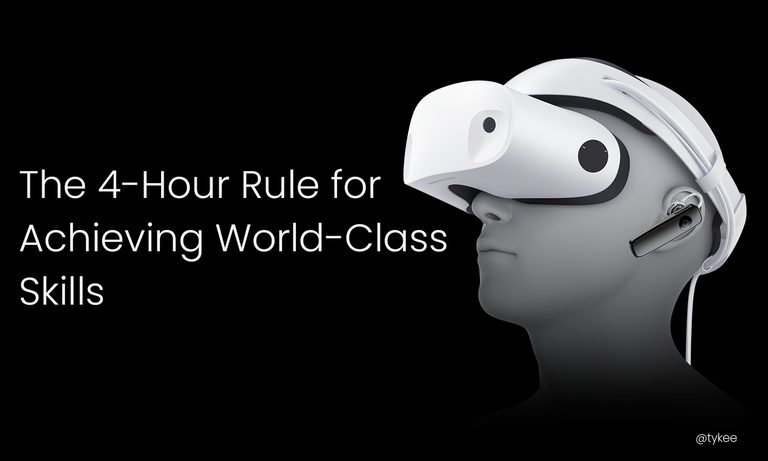
In a world of values specialization and expertise, the idea of achieving mastery in a particular skill or field has captivated many aspiring individuals. A study exploring the correlation between time investment and skill mastery suggests that dedicating four hours a day to deliberate practice can elevate one to the pinnacle of excellence within a specific discipline. The first time I heard this was a Church and I followed to understand more.
The concept is rooted in the work of psychologist Dr. K. Anders Ericsson, whose research on expertise and skill acquisition has gained widespread recognition. The 4-hour rule, as derived from Ericsson's findings, posits that focused and intentional practice for four hours each day can lead to exceptional proficiency over time.
Deliberate practice goes beyond mere repetition; it involves a strategic approach to learning, pushing one's limits, and seeking continuous improvement. Whether it's playing a musical instrument, honing a sport, learning to code or mastering a complex subject, deliberate practice is characterized by mindful engagement and a commitment to pushing the boundaries of one's comfort zone.
Consider the journey of a coder. By dedicating four hours a day to focused, deliberate practice—comprising scales, technical exercises, and the mastering of challenging programming— a developer can significantly enhance their skills over weeks, months, and years. The incremental progress made during each session contributes to a cumulative effect that propels them towards excellence.
The beauty of the 4-hour rule lies in its scalability. Regardless of the chosen field, from athletics to arts to academia, consistent and purposeful practice can lead to remarkable advancements. However, it's crucial to emphasize that the effectiveness of this rule hinges on the quality of practice rather than sheer quantity. Mindful engagement, feedback integration, and targeted improvement are essential components of the journey towards mastery. I decided to move back into full stack recently and I have gained more knowledge because of my deliberate practice.
Numerous real-world examples validate the efficacy of the 4-hour rule. Renowned individuals in various domains, from chess grandmasters to musicians, attribute their success to disciplined, daily practice. It's not the amount of time spent, but the deliberate and focused nature of the practice that makes the crucial difference.
The 4-hour rule represents a pathway to excellence, emphasizing the transformative power of deliberate practice. By committing to intentional and focused learning, individuals can embark on a journey that transcends mediocrity and propels them towards becoming world-class experts in their chosen fields.
The future is bigger than what you know. Investing in knowledge is the greatest thing you can do for yourself.
I am @tykee
Very good information regarding the 4-hour rule. Thanks
@sagarkothari88 vote
Thank you @luckyali
Hello.
There is reasonable evidence that this article is machine-generated. We would appreciate it if you could avoid publishing AI-generated content (full or partial texts, art, etc.).
Thank you.
Guide: AI-Generated Content = Not Original Content
If you believe this comment is in error, please contact us in #appeals in Discord.
Nah. It was just to proofread.